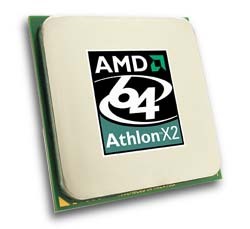AMD's Athlon64 X2 trumps Intel's Pentium D
Westlake Village (CA) - The first review of AMD's dual-core desktop processor Athlon64 X2 is in. Test results show a solid performance lead of the AMD chip over Intel's dual-core Pentium D.
A few weeks ahead of the official launch of the AMD's and Intel's desktop-dual-core chips, users are getting a better idea how the chip strategies of the two companies unfold and which benefits and performance the first dual-cores will offer. While both processors will bring substantial improvements, especially for multimedia applications and multitasking, a first in-depth of Tom's Hardware Guide concludes that the Athlon64 X2 will hold the performance crown.
The review also examined the power consumption of the chips which revealed a more efficient AMD architecture. While the complete Intel system consumed more than 350 watts, the AMD platform topped out at a more acceptable 235 watts.
Of course these two chips are debut processors and Intel may catch up with AMD's advantage in the coming months. Presler, which will carry the 900-series product name, will transition the dual-core to 65 nm early in 2006 and will bring visible improvements in power consumption. A completely new architecture is scheduled to be introduced for the end of 2006: Conroe will move away from the NetBurst architecture introduced back in 2000 and is expected to use take ideas from the Centrino platform to reduce power consumption.
Related stories:
AMD launches dual-core Opteron, announces X2 brand for desktop dual-core
Intel preps second generation dual-core: Pentium D 900 series
Get Tom's Hardware's best news and in-depth reviews, straight to your inbox.

Wolfgang Gruener is an experienced professional in digital strategy and content, specializing in web strategy, content architecture, user experience, and applying AI in content operations within the insurtech industry. His previous roles include Director, Digital Strategy and Content Experience at American Eagle, Managing Editor at TG Daily, and contributing to publications like Tom's Guide and Tom's Hardware.
